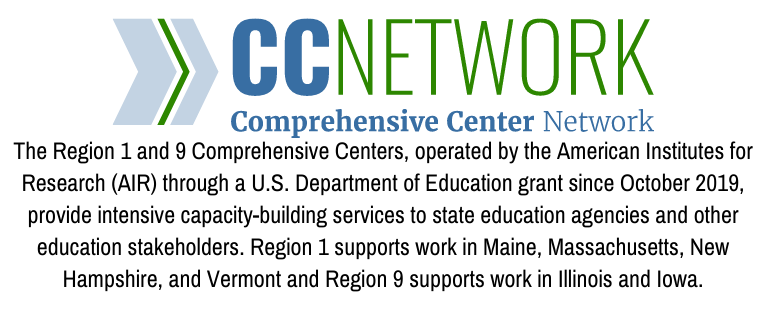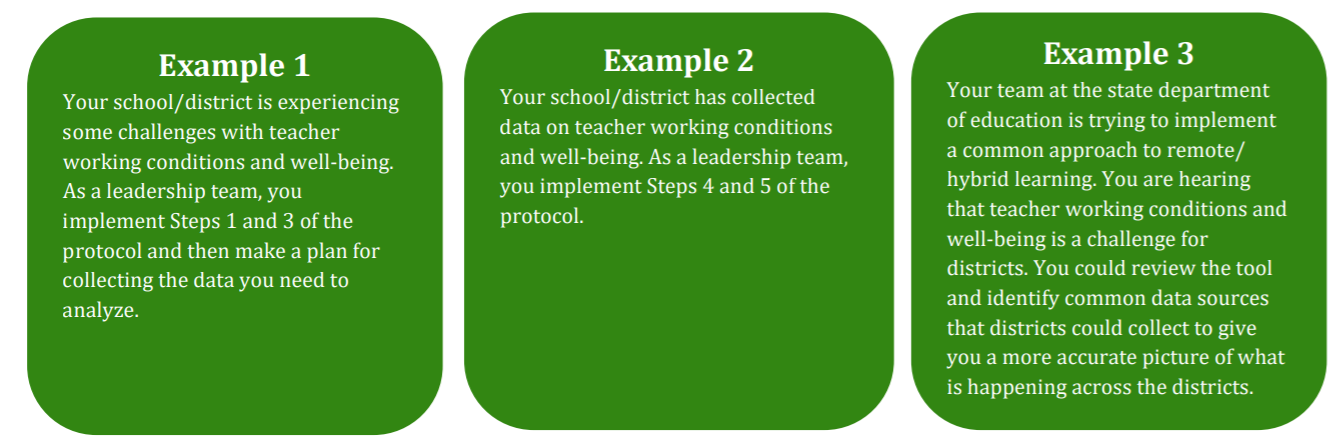Pulse Checks on Teaching Conditions and Teacher Well-Being
Using rapid pulse check surveys and collaboration to assess teaching conditions.
Featured Resource
AIR's Teaching Conditions Survey
A valid, reliable survey centered around nine crucial teaching condition factors, the Teaching Conditions Survey provides states, districts, and schools with dashboards and reports that visualize important feedback from teachers and noninstructional staff that policy-makers can use to improve teaching conditions and school culture and climate.
Client
Maine Department of Education; Massachusetts Department of Elementary and Secondary; New Hampshire Department of Education; Vermont Agency of Education; Iowa Department of Education; Illinois State Board of Education
Project
Facilitated a Community of Practice to develop a framework for assessing teaching conditions and create a set of rapid pulse check surveys to monitor teacher perspectives on their rapidly evolving and adapting learning settings (e.g., remote, hybrid).
Outcome
Schools and districts can implement these pulse check surveys routinely throughout the school year to observe trends in teacher perceptions of working conditions over the course of a school year.
Team
Tammie Knights, GTL Center and R9CC
The Challenge
Teachers are facing new, significant challenges to their well-being and the quality of working conditions. Intensifying teacher stress has contributed to growing concerns about teacher well-being and an increased policy focus on reversing teacher attrition. To ensure the teacher workforce is receiving support aligned to specific and evolving needs, many states and districts are assessing the quality of teacher working conditions and teacher well-being. Routine examination of working conditions and teacher well-being is critical to better understanding the supports required as teachers address the new technical, pedagogical and instructional demands on their time. States and districts can make better investments by creating targeted “pulse checks” – quick response surveys - that assess teacher experience as they implement new models of instruction, address student learning loss, and consider growing needs around social and emotional supports.
The Opportunity
Using the GTL Teaching Conditions Survey as a foundation, the Region 1 and Region 9 Comprehensive Centers* partnered with the State Education Agencies in Maine, Massachusetts, New Hampshire, Vermont, Illinois, and Iowa to form a Community of Practice (CoP) to develop a set of frameworks for assessing teaching conditions in rapidly evolving and adapting learning settings (e.g., remote, hybrid). They explored existing measures of teaching conditions, identified new measures, and developed a framework that CoP members and other districts or school leaders can use to assess teaching conditions and teacher well-being within new remote and hybrid learning models.

The Approach
Teaching conditions are typically examined by states and districts on an annual basis. However, the recent demands for changing teaching and learning formats require more frequent monitoring and assessing of teaching conditions. In response to this new context, the Region 1 and Region 9 Comprehensive Centers in collaboration with SEA partners developed a set of rapid pulse check surveys. The surveys focus on four critical constructs of teaching conditions and teacher well-being:
- Time
- Learning Environment and Resource Management.
- Supporting the Social and Emotional Health of Students and School Staff
- Professional Learning and Teacher Leadership.
The result of this collaboration is the District Metrics for Quality Remote/Hybrid Learning: Teacher Working Conditions and Well-Being.

Pulse Checks on Teacher Well-Being
Pulse-check surveys are a proactive way for schools and districts to routinely monitor how teachers are responding to new remote and hybrid models of instruction. Pulse checks allow for timely, responsive intervention based on teacher feedback to maintain and improve teaching conditions. These pulse check surveys are brief and can be completed in less than 5 minutes on any internet-enabled device . The data collected is simple and easy to aggregate. Schools and districts can use the data to observe trends in teacher perceptions of working conditions over the course of a school year. The GTL Center at AIR offers decades of experience administering surveys, analyzing and interpreting data, and providing technical assistance to schools and districts to build their capacity in these areas.
Schedule a virtual conversation with one of our content experts to talk more about implementing a pulse check survey that fits your state or district needs.




